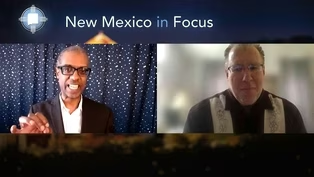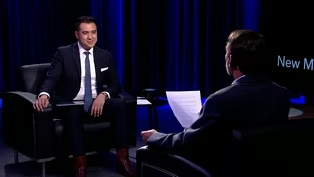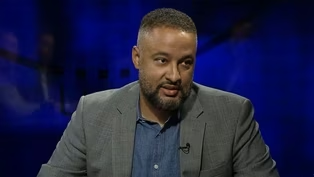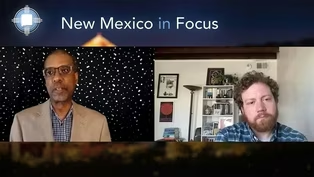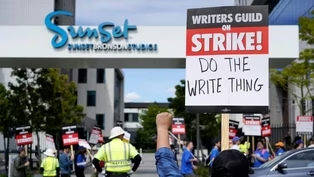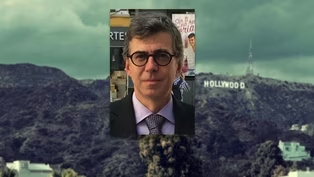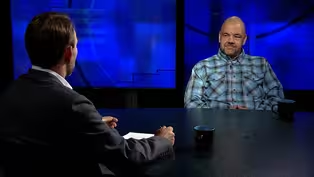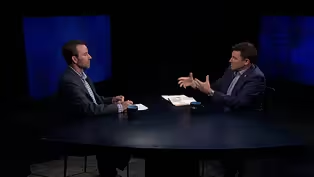New Mexico In Focus
Analyzing the NM Journalism Landscape with Trip Jennings
Clip: Season 17 | 20m 19sVideo has Closed Captions
Gene Grant speaks with Trip Jennings in a recent Facebook Live about state journalism.
Gene Grant speaks with New Mexico In Depth Executive Director Trip Jennings about the state's journalism ecosystem and where his news organization fits in.
Problems playing video? | Closed Captioning Feedback
Problems playing video? | Closed Captioning Feedback
New Mexico In Focus is a local public television program presented by NMPBS
New Mexico In Focus
Analyzing the NM Journalism Landscape with Trip Jennings
Clip: Season 17 | 20m 19sVideo has Closed Captions
Gene Grant speaks with New Mexico In Depth Executive Director Trip Jennings about the state's journalism ecosystem and where his news organization fits in.
Problems playing video? | Closed Captioning Feedback
How to Watch New Mexico In Focus
New Mexico In Focus is available to stream on pbs.org and the free PBS App, available on iPhone, Apple TV, Android TV, Android smartphones, Amazon Fire TV, Amazon Fire Tablet, Roku, Samsung Smart TV, and Vizio.
Providing Support for PBS.org
Learn Moreabout PBS online sponsorshiphey folks welcome to another conversation regarding media the landscape global national but mostly local here with New Mexico in-depth Tripp Jennings he's the executive director we've welcomed him not at the table like he usually is in studio but over over Zoom uh trip interestingly when I go to the Mexico in depth site you know it's interesting you met with a two-word sentence on your website smart comma investigative and I'm knowing you a little bit now I've known you for a few years now is this a derivative of perhaps a mission statement you guys worked out originally or do explain what those two words mean when you when people go to your site you know part of that is that we you know when you think about marketing you want something really quick you want a couple of words smart and investigative and that's primarily you know what we do here at New Mexico in depth um uh we are um you know 11 years old and we basically some of our stories will take weeks if not months to produce so we wanted to capture you know what we thought um maybe described us we have a separate you know separate mission statement which is maybe not much longer than that but it's just kind of how do you grab folks in an era of social media and there's so much noise out there how do you how do you you know penetrate that so that's part of why we use smart and investigative good stuff there I want to talk about that long form stuff you guys do here a little bit but um you know you've got a lot of experience for folks that don't know you the journal you've got to buy online certainly The Sun News Santa Fe New Mexican and a lot of stuff out of state and you're originally from Georgia and you've started you know your career in other places yeah um you know what led you to want to create New Mexico in depth in the first place back then in those that 11 years ago what was the need you saw sure um you know just so the your viewers will get a sense of this um I my first half of my career was in newspapers and you're right I started in Georgia uh moved to California Florida Connecticut um and basically it was uh the old school kind of thing where you start covering the Pumpkin Festival you know in your first job and then maybe the school board and then maybe city hall and then you move up to you know if you're not become an editor a state house coverage so you gain a lot of experience um reporting on all manner of things by the time I got here in New Mexico in 2005 uh what brought me here was that you know Bill Richardson was was running for president uh he was saying he was not but it was obvious for from people who cover politics that he was and I moved here to cover him and I think you know my my kind of thesis statement about the health of an ecosystem is that basically you can't really judge an ecosystem uh and its Health unless you look at State Capital coverage state government coverage which is separate than legislative coverage and investigative um you know investigative coverage when I got to the state house in 2005 you could not find a seat in the media room it was uh I was covering Governor Richardson the legislator for the Albuquerque Journal you could not find a seat because the Las Cruces Sun News had someone up here obviously the Santa Fe New Mexico had people the you know the Albuquerque Journal obviously then you had kunm and you know I just it was just a big press Corps um you know in 2011 or 12 when I we started uh New Mexico in depth you could already begin to see the winning of the cocktail press Corps um these days um it's a ghost town up there you know so so part of this is is we identified um state capital coverage state government and investigative because I think for many journalists um those are sort of hidden beats and what I mean by that is that I think there's a lot of focus in this very important focus on local city county kind of coverage but um what happens with the state capital let's say is that you're thrust into a world that is really hard to make sense of unless you spend a lot of time up there um and you learn that you know through every day up at the Capitol through legislative coverage and then every day throughout the year covering state government that most of the news at a state capital is not during legislative debates on the house floor of the senate floor it's it's in the hallways and who who's talking to whom and that that takes a lot of time to build up if that makes sense and we also saw you know in 2008 um when the economic the Great Recession happened we really did start to see the the shrinking of newspapers that was already it was already evident and over the last 15 years I've seen estimates that we've lost a quarter of newspapers Across the Nation we're about to lose a third of them um there was one report that estimated that um that basically we had lost from 2004 to 2019 um 15 papers in New Mexico so and the reason I want to focus on New Mexico that's partly my experience but because newsrooms newspaper newsrooms had the most resources those are the folks that would do most of the state capital state government and investigative journalism and that I'm not dismissing anything that TV stations or radio stations do is just newspapers always used to have the most resources if that's I don't know if that does that answer your question yeah no it you really kind of uh you did you kind of threw a lasso around it a big one but when you pulled it tight it was there you know it really is interesting I have to go to the original point there that you can really get a beat on a community what even I've done this many times and some of you when you go to a brand new place you settle in with all the newspapers you can find you you find out who the Big Morning News uh show is on radio you check out what's happening on TV the night before you can pretty much figure out fairly quickly within a day's news cycle where that Community is on that specific kind of coverage you mentioned in the health of that coverage in that Community I think you're exactly running the point there it's interesting and I think for New Mexico uh trip I'm wondering if the way you guys do it be a non-profit is starting to show itself as the way to get back to what you mentioned what you witnessed in 2005 and back in that era is there are we showing something here in our economy that this is the way to go if we want robust state in local coverage like this you know I think so um you know we started in 2012 we were the first non-public media non-profit right um locally operated before there was the New Mexico independent but that was operated out of DC that was a network um we were the first locally operated in 2012 um there are four now in New Mexico uh to give you an example nationally we were the 60th member to join a Trade Organization that's now known as The Institute for non-profit news we thought we were behind the curve 60th member uh as of this summer they had 450 members oh wow and so um yes there and a lot of them are doing not everyone is doing state capital state government and investigative reporting but they are filling in the gaps as newspapers and other media Outlets shrink um the stuff that we do um you know we did a large series on New Mexico leading the nation in alcohol-related deaths not even close New Mexico is number one um and that this is like an old school newspaper thing that generated a lot of legislative action um we did something that we did that let me stop you there so the folks know what you're talking about here that was a seven part series folks that trip just mentioned by Ted Alcorn who if there's one thing to read to understand the alcohol problem and how it filters out in many many cuts of our life here especially financially that's the one and I say that I'm leaning into that trip a little bit to augment what you just said it got legislative eyes opened it was a very old school how press can act as a lever and pry something open that we are unwilling to face and we had to face it after that seven part Series so I hear your point you kind of Breeze by it but I want the folks to know no no serious man yeah and and honestly it is uh like newspapers we dumped it all at one time because we're online but the Santa Fe New Mexican picked up all the stories and ran it over three weeks and it was this old school kind of newspaper series when they used to dump it in a short amount of time um you know another example and it it involves your executive producer there at New Mexico uh PBS which is of Jeff Proctor um he used to work with us a different example is you know basically over a year and a half he did a lot of reporting we edited it we created a data sheet on an operation in Albuquerque run by the ATF that kind of pitched itself as the worst of the worst and once you looked at it you realize that these people they they picked up or not the worst of the worst they were picking up mostly low-income homeless people selling an ounce of meth on a quarter not high level Distributors which anybody who follows a drug trade that's what you think and mostly in a city with three percent African-Americans 20 28 of the people picked up were African-American so you know that's kind of like what newspapers used to do um and I'm not taking away from the Journal of the new Mexican it's just we have to help you know the non-profits are there to kind of do a lot of more of this kind of reporting we've had a number of non-profits come up since you guys started is this competition to you is it is it you guys can't cover everything has everyone sort of staked out of their own ground and we're all better off as consumers right now what's your sense of the non-profit landscape as it sits now I I think that um it is it is incumbent upon us right now everybody's kind of doing their own thing we're staying in our lane because there is more than enough to cover in New Mexico um it isn't coming upon us to communicate I think um as we move forward uh because um you know I I was intrigued I'm sorry I'm going to move to the interview with the new Albuquerque Journal editor I'm I'm very interested to see what happens to the journal as it as are a lot of folks in Albuquerque and people who love newspapers and newspaper Journal alums um we're increasingly filling a need for the Journal of the new Max and other newspapers so um I I think that we we've got to figure out how as the need for more news becomes more pressing and it's going to become more addressing um figuring out how to keep talking to one another regularly and I have you know I know a lot of folks Sean uh Griswold who is at source New Mexico now you know worked for us so I have a lot of relationships Matt reichbach over the New Mexico political work we used to work together at the new Mexican independent so there are we have a great foundation for communication um we also have a great communication with uh with the public media that's another world that we all have to start we all have to start communicating right yeah we do communicate don't get me wrong but more so and more regularly because I have the world has changed that's right that's right and as you said the state's so big so diverse so geographically diverse diverse in every possible way no one publication can get in the weeds with anything it's just not even not even close um you know let me I got a couple questions about new tech and all kinds of other things that sort of fit into this idea of non-profits uh being on a par with you know for-profit Enterprises and how you guys might have an advantage actually but let me go back to the state capital coverage and city council coverage and County Commission coverage and things of that nature how is it how are you finding uh attracting reporters who want to start their careers slogging that kind of stuff like we had to I mean I can't tell you how many City Council meetings that went on until midnight uh I used to sit with John Kerry from uh you know I mean I just yes that's how you learn you went week after week and got beat up is there a taste for that right now even in non-profit news Gathering world he yes it depends on uh the beat let me say that the reason that I'm I'm pulling for newspapers in the 21st century is they do really extraordinarily important work of being at the city council at the school board and those non-profits that do kind of the larger takeouts that take weeks and months we pay attention to the newspapers because they might identify an issue that you know what they might not have the resources and and you know we can always collaborate with folks we have collaborated with newspapers before yeah so there is a um an ecosystem where the communication and an openness to collaboration is there and it needs to I think honestly it needs to be more robust and people are talking about that right now people are having these conversations is there a taste for it um in our world yeah there's a taste for it when we talk to folks we worked with many young reporter I say many many for us who are smaller than the Albuquerque Journal like we don't have as they used to have like 75 people in The Newsroom that's not us but there is an understanding that you have to learn how things work at a local level before you can sometimes get into this larger and and that's what newspapers I want to say this about newspapers you would start community and you would work up and you would gain experience as you moved up and you would apply everything you you you learned um so that when you went to the state house or started investigating something on your beat you knew about programs how Revenue came through the city to the city from the state or you know what I'm saying that's yeah that's a good point there it's it's hard to replicate that kind of grounding business you have to really smell people's breath and let them get angry at you and learn how to deal with that and all that kind of stuff that's soft those soft skills that are super important uh the last question for your trip we're at I'm asking everybody this because it's something on our radar Academy I know for a lot of folks in the news business and that is the right now-ness of uh artificial intelligence and how it relates to our business and most notably where it collides with transparency and trust and I'm curious where you're at trip on this I know a lot of the larger organizations are starting to have these conversations about how do we communicate to our respective publics that there may have been AI possibly used and some research here do we disclose that are we transparent about that because as you know there's gonna be a lot of game playing with these things especially now and there's another charge of us in the media business for election season everybody knows is is going to be so much fraud able to be pulled with people's voices that sound like it's actually them yeah you know saying all kinds of crazy things you can generate with AI tools that are free on the internet now it is on us as media people to be ever since Dart now more than ever a barrier to people's understanding about what is real and what is not so I'm curious from your perspective as a non-profit publisher and owner and CEO and the whole thing what does AI fit in your worry wheel and how are you guys talking about this well you know I mean there are benefits I.E you can actually maybe help no internally I AI can help you right a job description and then you can tailor it right you know there are certain things like that which I'm cool with yes we have to be mindful if a story goes out hey reporter did you use AI to write this we need to know this so we can um we can tell the public trust is really important always has been important the thing that worries me the most is that um I have seen you know as we all have what AI is capable of and not only the the you know the the the the the videos the the Deep fakes stuff like this but also they can sound so much like a human in the text and human beings I think there's a lot of resources that serves this when they hear someone that hear or read someone who actually sounds human they think it is human they give it Authority and that really worries to me because we have seen memes on Facebook and Twitter really you know go viral and people believe stuff without stopping and going uh wait how do we know this and so this is very worrisome for us internally I know a lot of people at the national level and non-profits are talking about this um because they are worried as well because as you said um it's coming and and and uh how do you how you monitor fraud how do you it's gonna be crazy that's right that's right you know people can you know say all they want you know the solution is going to have to be a tech solution meaning you're going to have to have some kind of tech to tell you that it detects that this is Tech meaning it's not it's it's not a real person it's a you know a deep fake if that's the answer we're all in trouble because it honestly some organization is going to get popped doing that if you really think about it it just puts everybody at huge risk now forget live quotes even video quotes are going to have to be really vetted yes and now I'm going to say this too that the way this works is these things are just sucking up all this information from across an internet and there are concerns about um the analysis and sometimes there might be you know um honestly people of color are you have to be careful of this stuff because there's been a lot of data around white people but sometimes it misses communities of color that's a big issue frankly so this also that too I appreciate that that tells me right there you're leaning forward on this not a lot of folks are realizing that I read about that too so get on your trip on that hey Tripp Jennings thank you very much from New Mexico in depth we love it at New Mexico InFocus and New Mexico PBS certainly we love working with you guys and we have been for a lot of years for good reason and the long-form writing that you do the ability to get under the skin of stuff is so necessary here and I'll say back again if you go to their site it was at nmm.org do I have that right.net.com find that Ted Alcorn series folks I'm telling you if you're new here in New Mexico and want to Bone up on what happens around here that's your catch-up when it comes to alcohol and so Tripp thank you very much for everything give our guys credit it's worth a couple of weeks to take a look at this media landscape thing we've really dug a lot of stuff up and you've been great with it thank you absolutely see you next time folks we'll see you Friday night seven o'clock Channel 5.1 to continue the conversation about media here in New Mexico so until then stay out of this heat and take care
Analyzing the NM Journalism Landscape with Trip Jennings
Video has Closed Captions
Clip: S17 | 20m 19s | Gene Grant speaks with Trip Jennings in a recent Facebook Live about state journalism. (20m 19s)
US Attorney on APD Corruption Case
Video has Closed Captions
Clip: S17 Ep38 | 26m 46s | US Attorney Uballez on the investigation of the Albuquerque Police Department's DWI unit. (26m 46s)
Exploring Solutions to Prevalence of NM Police Shootings
Video has Closed Captions
Clip: S17 Ep18 | 12m 31s | Jeff Proctor and a special panel explore solutions to the prevalence of police shootings. (12m 31s)
Full Interview | Source NM Reporter Patrick Lohmann
Video has Closed Captions
Clip: S17 Ep6 | 17m 17s | Prescribed burns & announcement that the U.S. Forest Service caused the Cerro Pelado fire. (17m 17s)
Full Interview | SAG-AFTRA NM President Talks Actors Strike
Video has Closed Captions
Clip: S17 Ep5 | 15m 54s | Marc Comstock talks about the ongoing writers and actors strike and union members demands. (15m 54s)
Full Interview|Kirk Ellis on the Actors & Writers Strike
Video has Closed Captions
Clip: S17 Ep5 | 51m 7s | Get Kirk Ellis' impressions on the film actors’ and writers’ strike. (51m 7s)
Patrick Ethridge: Executive Editor | Full Interview
Video has Closed Captions
Clip: S17 Ep1 | 28m 29s | Interview with the new executive editor at the Albuquerque Journal, Patrick Ethridge. (28m 29s)
Pat Davis: Politician and Newspaper Magnate | Full Interview
Video has Closed Captions
Clip: S17 Ep1 | 23m 27s | Executive Producer Jeff Proctor talks with Albuquerque City Council President Pat Davis. (23m 27s)
Providing Support for PBS.org
Learn Moreabout PBS online sponsorship
- News and Public Affairs

Top journalists deliver compelling original analysis of the hour's headlines.

- News and Public Affairs

FRONTLINE is investigative journalism that questions, explains and changes our world.












Support for PBS provided by:
New Mexico In Focus is a local public television program presented by NMPBS
